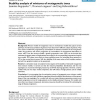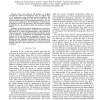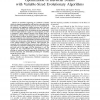1099 search results - page 61 / 220 » On the Complexity of Computing Evolutionary Trees |
BMCBI
2008
14 years 10 months ago
2008
Background: Mixture models of mutagenetic trees are evolutionary models that capture several pathways of ordered accumulation of genetic events observed in different subsets of pa...
ISPASS
2008
IEEE
15 years 4 months ago
2008
IEEE
— This work addresses the problem of building representative subsets of benchmarks from an original large set of benchmarks, using statistical analysis techniques. The subsets sh...
109
click to vote
EGICE
2006
15 years 1 months ago
2006
Abstract. In knowledge representation by fuzzy rule based systems two reasoning mechanisms can be distinguished: conjunction-based and implication-based inference. Both approaches ...
CIBCB
2007
IEEE
14 years 11 months ago
2007
IEEE
—In metabolic engineering it is difficult to identify which set of genetic manipulations will result in a microbial strain that achieves a desired production goal, due to the co...
119
click to vote
NCA
2006
IEEE
14 years 9 months ago
2006
IEEE
The use of multilayer perceptrons (MLP) with threshold functions (binary step function activations) greatly reduces the complexity of the hardware implementation of neural networks...



